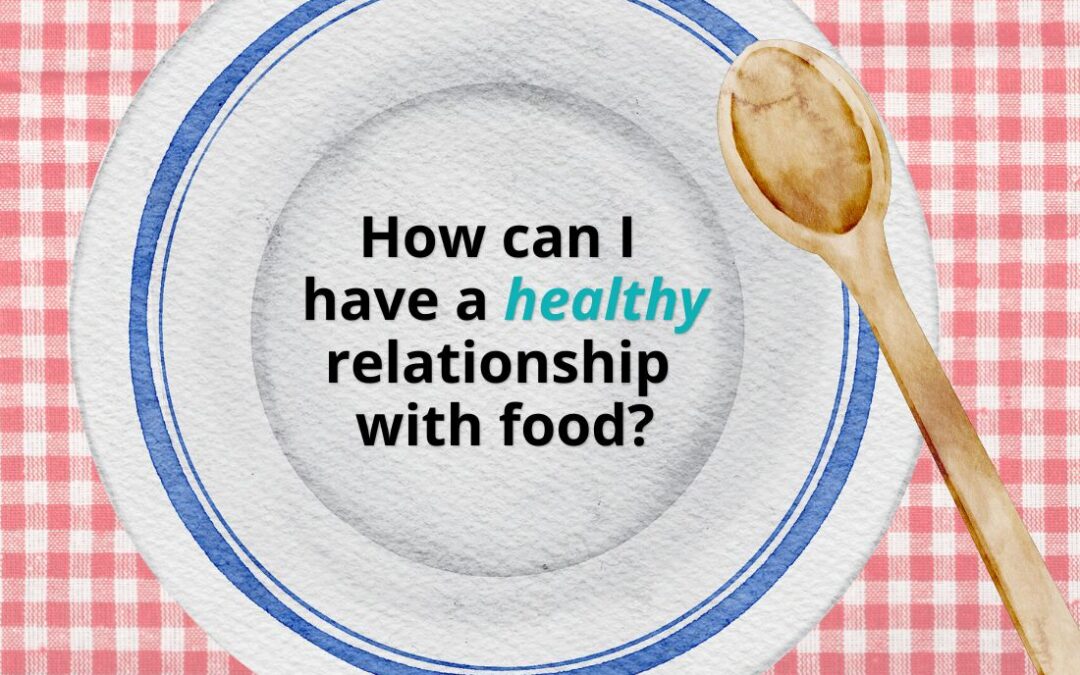How Can I Have a Healthy Relationship with Food?
Wondering how to have a healthy relationship with food?
A healthy relationship with food starts by letting go of strict rules and embracing balance and flexibility. It means listening to your body’s hunger and fullness signals, enjoying all types of foods without guilt, and recognizing when emotions, rather than hunger, drive your eating.
This approach allows you to nourish your body while also finding pleasure in food, to create a more positive, stress-free relationship with what you eat. It’s not about perfection or restriction—it’s about trusting yourself and making peace with food one step at a time.
Written by Jenn Hand, Holistic Nutritionist, Board Certified Health Coach, NBC-HWC
If you’ve ever felt trapped in a cycle of restrictive diets, emotional eating, or guilt around food, you’re not alone.
Many women who are trying to figure out how to have a healthy relationship with food are looking for a way to break free from these patterns and find a balanced, stress-free approach to eating.
Maybe you want to enjoy food without constantly worrying about calories. Or maybe you want to stop the bing-restrict cycle and finally feel more at peace with your food choices.
In this post I’ll cover 16 things you can do to start having a healthier relationship with food and become a “normal eater.”
Table of Contents
- How Can I Have a Healthy Relationship with Food?
- Becoming a Normal Eater
- 16 Steps You Can Take to Have a Healthy Relationship with Food
- Final Thoughts
- Common Questions
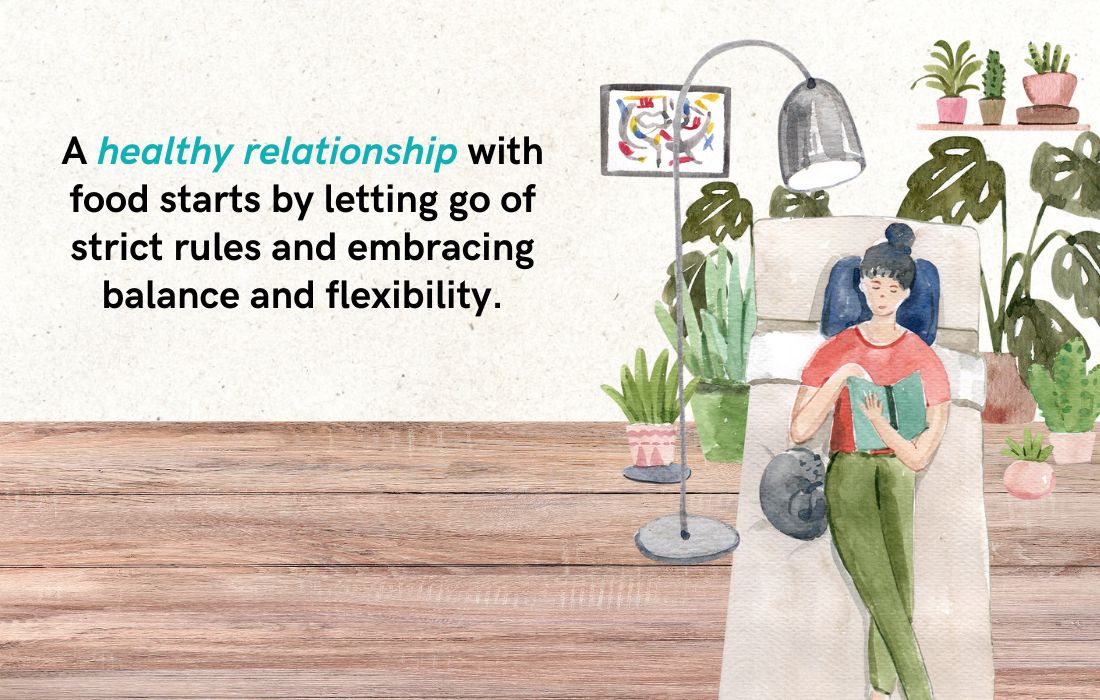
Becoming a Normal Eater
I worked with a client who felt like she was constantly at war with food.
She had been dieting for as long as she could remember, jumping from one strict eating plan to the next, with phases of extreme restriction followed by bingeing. Food was something she feared and obsessed over, always counting calories, avoiding social events, and battling cravings.
When she came to me, she told me she just wanted to be a “normal eater.” She wanted to be someone who could enjoy food without guilt and without feeling out of control.
She felt such shame over not being able to control bingeing and ate in secret every night when her husband went to bed (something I could very much relate to).
Through our work together, she began to let go of rigid rules and learned to tune into her body’s hunger and fullness cues. At first, it was uncomfortable for her to give herself permission to eat, but over time, she realized that when she stopped restricting, the urge to binge lessened.
She started practicing intuitive and mindful eating, gradually making peace with all types of food.
Today, she no longer views food as the enemy. She eats when she’s hungry, stops when she’s satisfied, and allows herself to enjoy everything from salads to desserts without guilt.
Becoming a normal eater wasn’t about following another diet—it was about finding trust in her body and learning to embrace food in a more relaxed, balanced way.
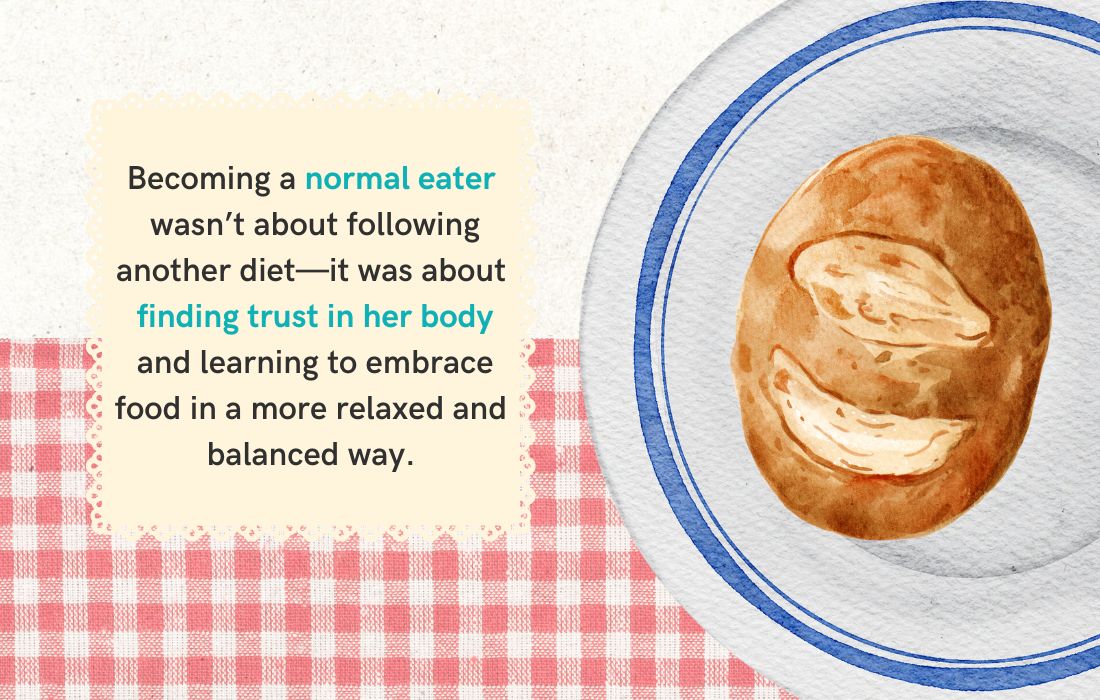
16 Steps You Can Take to Have a Healthy Relationship with Food
A healthy relationship with food is about balance, flexibility, and enjoyment (which are words usually foreign in the diet world where we learn lots of shoulds/shouldn’ts!)
Instead of rigid rules or diets, it’s learning to tune into your body and embrace food as a source of nourishment and pleasure. By focusing on how food makes you feel and what your body needs, you can develop a more peaceful and positive approach to eating.
1. Understand Your Relationship With Food
Reflect on how you view food and eating.
Is it a source of stress, comfort, or control? Understanding your unique relationship with food is the first step to creating a healthier, more balanced approach. The first step to change is always through awareness of what is going on!
2. Recognize Emotional Eating
Typically those of us who’ve struggled with food didn’t learn how to “deal with” emotions growing up.
Emotional eating happens when we use food to cope with feelings like stress, sadness, or boredom. Learning to recognize when you’re eating for emotional reasons helps you address those feelings in healthier ways.
3. Get Started with Intuitive Eating
Intuitive eating is about tuning into your body’s natural hunger and fullness signals rather than following external rules.
By listening to what your body truly needs, you can enjoy food without guilt and restriction. I typically add in a bit of structure to intuitive eating so that it’s “easier” to start with some guidelines to focus on (I teach eating proteins and carbs every 3-4 hours as a starting point.)
4. Practice Mindful Eating
Mindful eating means being present while you eat, focusing on the taste, texture, and experience of your meal.
This practice can help you slow down, enjoy your food more, and prevent overeating. In our fast paced society, it can take some practice to learn to slow down and eat without multi-tasking.
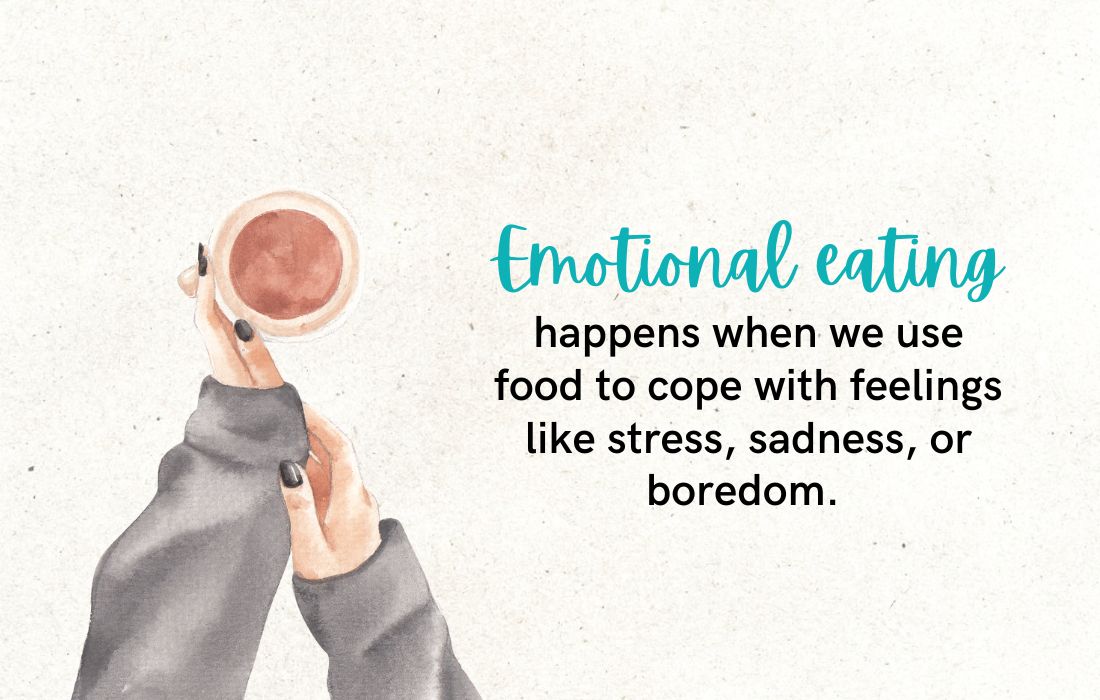
5. Welcome All Foods to Your Diet
Allow yourself to eat all types of food without labeling them as “good” or “bad.”
By welcoming all foods, you can reduce the feelings of deprivation that often lead to bingeing or overeating. This is a process, as we usually have a lot of baggage we pick up when we diet.
Learning to neutralize foods and focus on whether or not they work for our bodies is a big way we heal our relationship to food.
6. Overcome Food Fears
Many people develop fears around certain foods, believing they will cause weight gain or health issues.
Overcoming these fears allows you to enjoy a more varied and satisfying diet without anxiety. Look at this intention as lots of small steps over time–start with foods that are less scary and work towards the ones that cause more anxiety over time.
7. Give Yourself Permission to Eat
This is a huge paradox on this path–denying yourself food only leads to stronger cravings.
Giving yourself permission to eat (both mentally and physically) allows you to honor your hunger and prevents feelings of deprivation.
8. Enjoy Food Without Guilt
Guilt often accompanies eating certain foods, especially those labeled as “unhealthy.”
Remind yourself that it’s okay to eat all foods in moderation, especially as you’re learning what works for your body. This can help you let go of food guilt and and trust that all foods can fit into a balanced lifestyle.
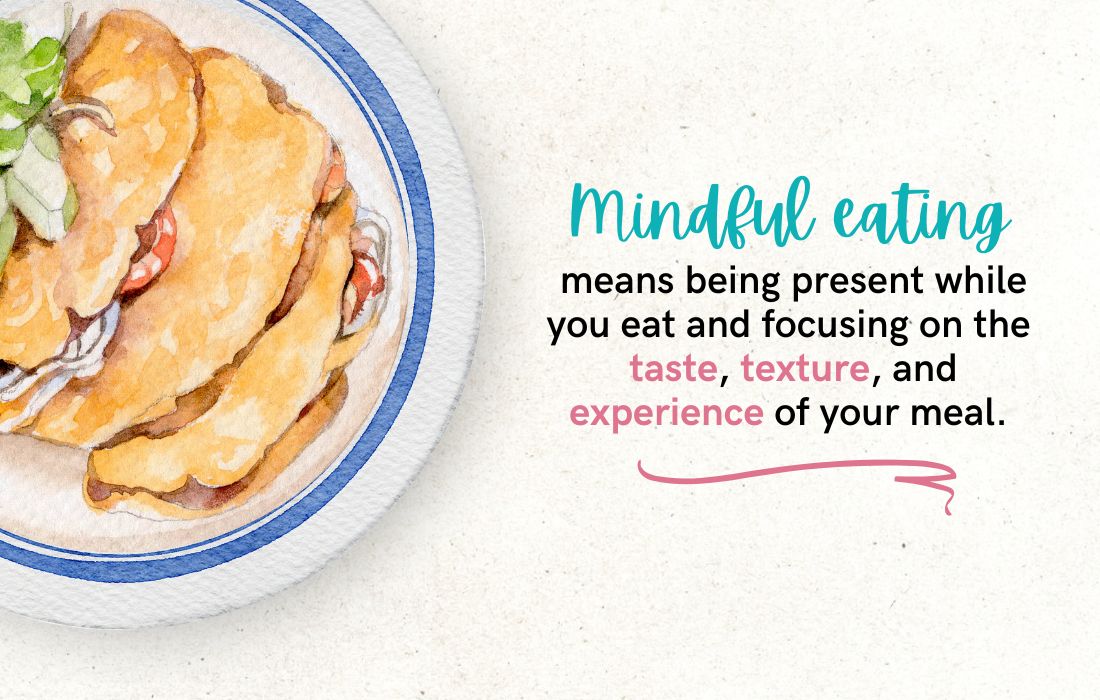
9. Make Regular Meals a Habit
Skipping meals can lead to intense hunger and overeating later.
By eating regular meals throughout the day, you keep your energy levels stable and avoid extreme hunger. The diet brain always wants to go “as long as we can without eating.” But this always backfires because we can’t fight the physiological need for fuel!
10. Don’t Fixate on Nutrition
While nutrition is important, obsessing over every nutrient can lead to a rigid and stressful relationship with food.
Focus on balance and variety rather than perfection.
11. Know When to Eat and When to Stop
Tuning into your body’s hunger and fullness cues helps you know when to eat and when to stop.
This helps prevent overeating and promotes a more intuitive approach to mealtime. I typically have clients start eating every 3-4 hours as a foundation to then begin to tune into body signals and cues. The clock can be a great guide for this at first!
12. Manage Stress Without Turning to Food
Instead of turning to food to cope with stress, find non-food-related ways to manage your emotions, like exercise, meditation, or talking to a friend.
Exploring what need food is filling can uncover why we use food so we can then look at how to get those needs met.
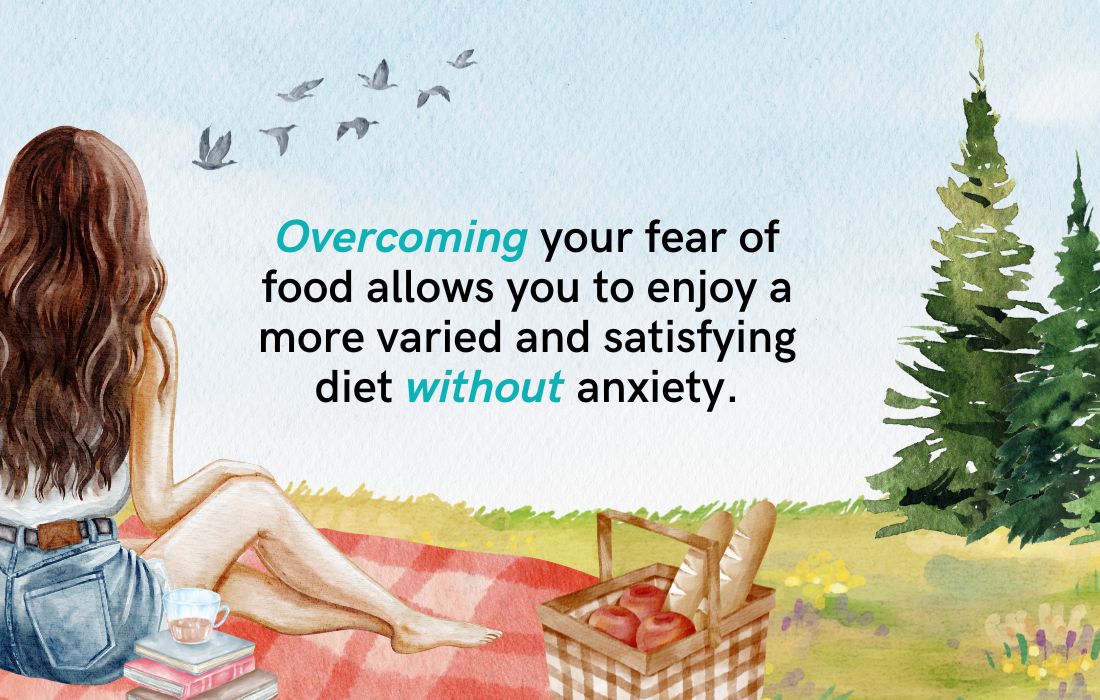
13. Surround Yourself With Positive Influences
The people around you can affect how you view food and your body.
Surround yourself with those who encourage a healthy, positive relationship with food and body image. This includes who you follow on social media!
14 . Address Food Guilt After Overeating
If you overeat, it’s easy to fall into a guilt spiral. Instead of punishing yourself, recognize that one meal won’t make or break your health, and focus on your overall habits.
Explore ways to move through the guilt–what would help you feel supported and taken care of? Getting out of your house? Journaling? A yoga class?
15. Seek Professional Support When Needed
If you’re struggling to overcome deep-seated food issues, consider seeking support from a therapist or coach who specializes in eating concerns.
16. Take It One Day at a Time
Creating a healthy relationship with food is a journey, not a quick fix.
Be patient with yourself, and remember that progress happens one small step at a time. When I was working to heal my own battle with food, I reminded myself all the time of my favorite Overeaters Anonymous slogan: one day at a time.
When you get discouraged or frustrated, reminding yourself to focus JUST on today can be helpful.
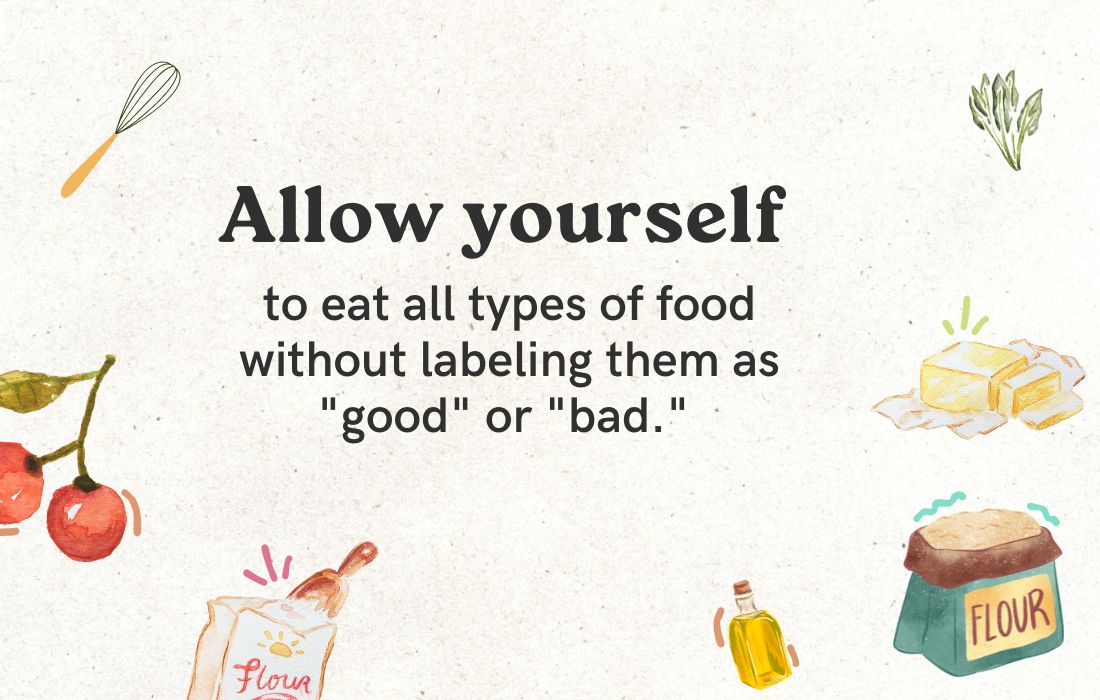
Final Thoughts
Building a healthy relationship with food doesn’t happen overnight, but with small, consistent steps, you CAN create lasting change.
Remember, pretty good is perfect! Embrace the journey, be kind to yourself along the way, and focus on balance, enjoyment, and flexibility.
By tuning into your body’s needs and letting go of food rules, you’ll find freedom in your eating and a more peaceful, nourishing approach to food.
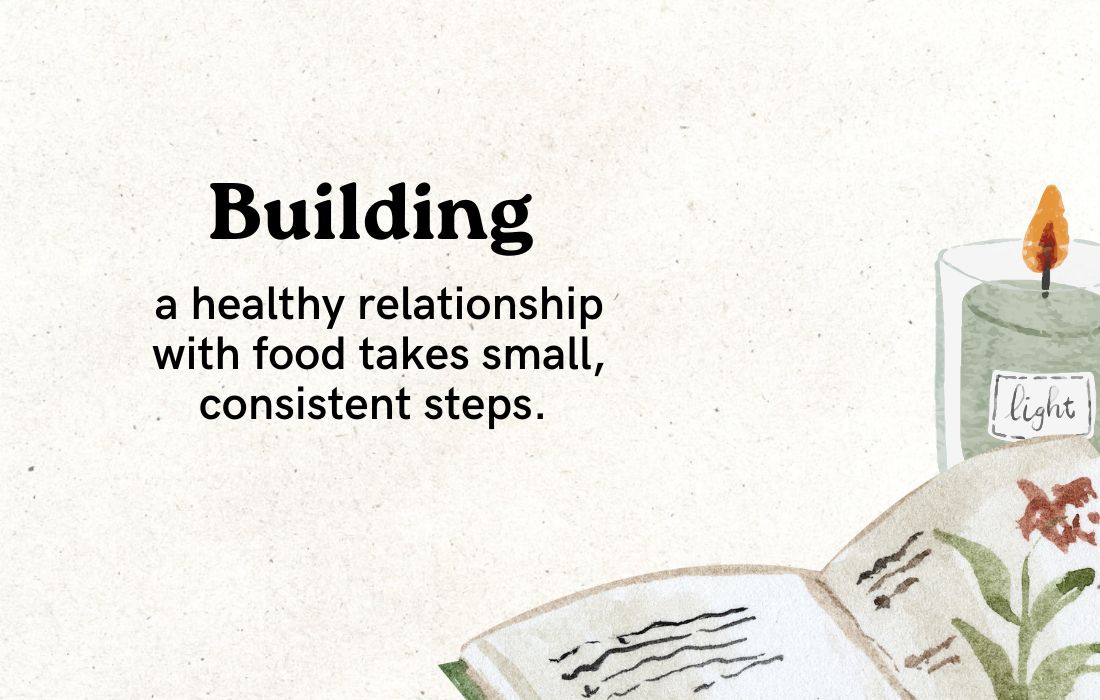
Common Questions
What are “healthy dietary patterns?”
Healthy dietary patterns include eating a variety of foods that nourish your body, tuning into your hunger and fullness signals, and enjoying food without guilt or restriction.
Remember to eat balanced. Try to include protein in all of your meals and snacks as this will help prevent you from overeating.
What does having a healthy relationship with food look like?
A healthy relationship with food means feeling at ease with your eating choices, enjoying all foods without guilt, and trusting your body to guide your hunger and fullness cues.
What’s the difference between disordered eating and an unhealthy relationship with food?
Disordered eating often involves more extreme patterns, like bingeing or restricting.
Whereas an unhealthy relationship with food can include chronic dieting, guilt around eating, or feeling stressed about food choices. There can be a lot of overlap and to me, labels don’t matter–it’s more important to look at what impact it’s having on your life.
What causes a bad relationship with food?
A negative relationship with food can stem from diet culture, unrealistic body standards, or using food as a coping mechanism for emotions.
Is skipping meals bad for you?
Skipping meals can lead to low energy and increased hunger later, which may cause overeating or bingeing.
Should I only eat healthy foods? Or can I sometimes eat junk food?
A healthy food relationship includes balance, so allowing yourself to eat all kinds of foods, including desserts in moderation, is key.
I’ve heard that I should eat food more slowly; is this true?
Yes, eating slowly can help you tune into your body’s hunger and fullness signals, making it easier to stop when you’re satisfied.
What is a food mood diary and how does it help?
A food mood diary helps track how your emotions, thoughts, and hunger influence your eating patterns, offering insights into your relationship with food.
If I limit food intake, will I end up binge eating later?
Yes, restricting food often leads to intense hunger, which can result in binge eating as your body tries to make up for the deprivation.
Are binge eating and overeating both “disordered eating” habits?
While binge eating can be a form of “disordered eating,” overeating is typically more common and doesn’t necessarily indicate disordered eating unless it becomes chronic and distressing.
How can I stop binge eating?
Healing binge eating starts with letting go of food restrictions, tuning into your body’s needs, and addressing the emotions driving the behavior.
And remember that going it alone can often take longer than if you get some help. Find a coach or nutritionist that you can work with to overcome binge eating.
Related Articles
⚪ Food Relationship Coach: How Coaching Can Help You Find Food Freedom
⚪ How To Stop Boredom and Emotional Eating
⚪ THIS Will Change Your Relationship To Food (And Yourself)
Get the Normal Eater’s Newsletter
Join 8000+ women who are overcoming overeating, binge eating, and breaking up with dieting forever. Get Jenn’s inspiring and actionable weekly newsletter with the latest posts, podcasts, and tips on how to love your body, find food freedom, and lose weight holistically.
Get the Normal Eater’s NewsletterWork with an Emotional Eating & Holistic Nutrition Coach
Overcome Bingeing and Emotional Eating and Break Up with Yo-yo Dieting
Working with an emotional eating coach and holistic nutritionist can help you get free from the frustrating binge and restrict cycle and stop yo-yo dieting.
You don’t have to be obsessed with food or have a million rules around eating to find your natural weight and learn to love your body. Ready to actually see a lasting change and experience true freedom?
Schedule a 20-min CallAbout the Author:

Jenn Hand has been helping women like you become normal eaters since 2015.
She’s worked with thousands of women, helping them to balance their bodies, end bingeing, stop obsessing over food, and start feeling amazing again. As a board-certified health coach and holistic nutritionist, Jenn knows how to support you in making real positive changes that last.
Her articles have been published on Mind Body Green, Tiny Buddha, Thrive Global and other local and global media platforms. She’s the author of How to Be a Normal Eater and the creator of The Normal Eater’s Club program. Listen to Jenn’s advice and tips on the Cake Doesn’t Count Podcast, or read more of her articles for free on the Food Freedom Blog.
Learn About Coaching!
